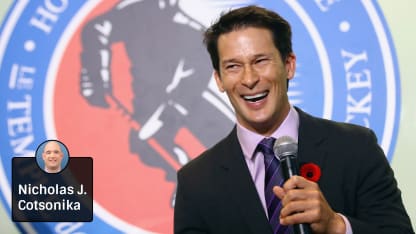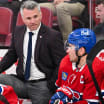Kariya back in spotlight at Hall of Fame festivities
Former NHL forward, out of hockey since 2010, being inducted Monday

RELATED: [For Selanne, road to Hall of Fame included street hockey in Winnipeg | Honorees recall getting call of lifetime]
Sharks that swim in the waters where he surfs at home in Orange County, California.
"I've actually seen three of them at the distance of this hall," Kariya said. "Just a little bit farther away, one of them actually breached out of the water, about a 7-footer, and that's a beautiful, amazing, powerful experience to witness live.
"And very scary at the same time."
The more Kariya spoke after the ring ceremony at the Hockey Hall of Fame on Friday, the more you understood why he has stayed out of the game the past seven years -- and the more you wondered what it would take for him to return in some capacity someday.
Kariya -- who had 989 points (402 goals, 587 assists) in 989 regular-season games with the Mighty Ducks of Anaheim, Colorado Avalanche, Nashville Predators and St. Louis Blues -- will be inducted Monday with Dave Andreychuk, Clare Drake, Danielle Goyette, Jeremy Jacobs, Mark Recchi and longtime teammate and friend Teemu Selanne.
Selanne said making the Hall of Fame has changed Kariya -- that he's happier, that he talks about hockey, that he's finally getting closure to his career, that it's going to bring him back.
"He's like a brother for me, and I can see through him -- how he thinks, how he feels," Selanne said. "The way how everything ended, it was not his own terms, and not the way he wanted it. That's why I feel he's a totally different guy now. That's why I really believe that if you find the right role for him in hockey in the future, we will see him somewhere."
When that was relayed to him, Kariya laughed. He said that he didn't think he had changed at all, that he never sought closure, never thought about it, never felt he needed it.
It is true that after he sustained a concussion playing for St. Louis against Nashville on April 10, 2010, he was angry. Doctors said he couldn't play anymore.
It is true that he has been to one game since and kept a low profile. He sneaked into a suite to see Selanne play one last home game for Anaheim in 2014. He gave few, if any, interviews until recently.
It is true that some of his friends in the NHL have gauged his interest in jobs, but nothing serious has come of it. No one has offered him anything; he hasn't proposed anything.
But he isn't bitter. After retirement, he found purpose in his recovery. He said he doesn't think about concussions when he looks back on his career, and doesn't feel like he disappeared or became disconnected from the game.
Most of his friends are from hockey, and when he sees them, they talk hockey.
"I still watch," Kariya said. "I love watching hockey. I love watching all the great young players in the game today. It's more me being a private person and enjoying my life out of the spotlight."
Kariya is smart. He speaks well. He seems suited for an executive position. But what he loved about hockey was playing hockey.
"That's where my passion was," Kariya said. "And if I could right now, I would love nothing better than to keep playing hockey."
The next best thing for him is surfing. And snowboarding. And skiing. And cross-country skiing. And splitboarding. What's splitboarding? Climbing a mountain and coming down on a board.
At 43, Kariya is in incredible shape.
"When I retired, I still felt I had a lot of gas left in my tank as an athlete," Kariya said. "Take away the concussions, I felt unbelievable. Had my legs. Felt I had good jump and pop in my game. So when that was taken away from me, I felt like I needed to continue doing things athletically. …
"I love being an athlete."
Why take that away from him?
Kariya wouldn't rule out a hockey job in the future. But he said it would have to be the right situation with the right people, something to which he would be 100 percent committed. It would have to be something he would enjoy more than what he's doing now.
"If there was a big swell coming in and I was a general manager and there was work to be done, I've got to do the work and not worry about [surfing]," Kariya said. "That's something that I've got to think about."
What's scarier? Sharks or a commute?
"I'm much more frightened of the drivers on the 5 freeway," Kariya said, "than the sharks in the water."

















